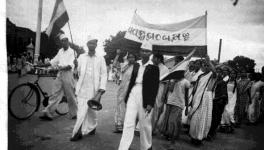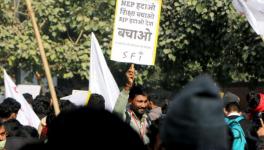Why Opposing NCERT Textbook Revisions Isn’t Enough
Image Courtesy: PxHere
Textbooks have always been protected by a code of innocence. This code is made up of two assumptions, and the first is that textbooks are universal. But textbooks have become the focal point of education to the point that the word can be used interchangeably with ‘syllabus’ and ‘curriculum’. For most educators and students, the primary concern throughout the academic year is to “finish the syllabus”, that is, to select certain passages from it and make sure everyone remembers them in time for the examination. If the textbook does not bother consolidating the facts, most students consult “guide” books from private publishers, which make the contents easier to remember.
This leads us to the second assumption: we assume textbooks are ideologically neutral. Students and teachers treat them as collections of facts to be memorised for the examination at the end of the year. If the textbook is a collection of facts, it must naturally follow that it is objective and neutral because that is the nature of a fact. This objectivity is essential because the examination objectively evaluates the knowledge that the student has acquired over a year by assigning it a number, usually out of 25 or 100. The examination gives the textbook its universal, objective status.
Since the textbook is a repository of facts students will memorise, the facts in question can become a volatile issue. This is truer for history than other subjects. The public uses of history and the search for historical ‘truths’ have predated the development of academic history in India. Different communities have used history to strengthen their political claims, especially since the late 19th century, with the rise of communalism and identity movements for oppressed castes. History textbooks have been central to these claims.
In 2012, the historian Janaki Nair was put under the radar for writing about the garment tax that the Nadars had to pay the Nairs in the Kanyakumari district in the 19th century. The opposition came from the Nadars themselves, sections of whom did not want to associate with that history any more—their image as oppressed castes wherein women were not allowed to cover their breasts did not fit with their political claims. Such controversies regarding history textbooks have existed since they were first written in the 1960s.
When the National Council for Education Research and Training (NCERT) decided to remove chapters regarding the Mughals and the Delhi Sultanate from the Grade 7 history textbook, Shobha Karandlaje, the Bharatiya Janata Party Member of Parliament from Udupi Chikmagalur, wrote that her party was only “correcting the wrongdoings” of previous textbooks which had no mention of “Mughal barbarism” among other things.
However, there is more to it. The NCERT director, Dinesh Saklani, used the words “syllabus rationalisation” to describe the decision to drop a select few chapters. The decision to drop chapters that do not align with the ruling party’s vision was dismissed as an administrative process to help ease the load on students. This warrants a discussion about what purposes the syllabus serves.
Textbooks, Examinations and Anxieties
The colonial government introduced the textbook and examinations. In traditional systems, the teacher had more autonomy over both. The texts the teacher selected as worthy of teaching often reflected the local economy’s needs since the purpose of school education was to create pupils who could serve its needs. If a particular accounting system was relevant to one area, it would be taught to the pupils. If the teacher felt a student was not ready to move to the next stage of learning, it was in their power to not let them proceed. Therefore, student evaluation was entirely in the teacher’s hands. The colonial State introduced the examination to create what the historian of education Sureshchandra Shukla called a “centralised and bureaucratised” education system.
The State required the control of both these processes to form, in Macaulay’s famous words, “a class who may be interpreters between us and the millions whom we govern”. The local teacher was, therefore, replaced by an impersonal State machinery. This machinery could be trusted to create similar candidates for similar posts. The philosopher Michel Foucault famously said that the State uses the examination to hierarchise surveillance and normalise judgement. The repeated cycles of examinations help put people in a single group—in this case, the class—in a hierarchy and create archives of this hierarchy. It also allows the authorities to translate qualitative knowledge into a number. The State can know what students could prove to be assets and “succeed”. Uniform standards of promotion allow uniform standards of employment.
This requires a uniform syllabus in the same geographical region. Therefore, when a Uniform Code of Rules was enacted upon the institutions of Bengal, there was a list of books on each subject attached to it for the scholarship examinations. Within the next ten years, the exact portions of specific books had been fixed. This system intensified as the colonial State’s bureaucratic system got increasingly elaborate. This was despite multiple warnings, most famously by James Kerr’s Review of Public Instruction in the Bengal Presidency, a report published in 1851.
Kerr writes that because “exactly the same course of study is rigidly prescribed to different institutions”, principals and teachers cannot adjust the course for “certain acquirements in certain districts”. As the great historian of education Krishna Kumar wrote, “Colonial pedagogy outlasted the colonial state”. Education in independent India continues the same pattern and remains textbook-bound.
The government’s decision to remove certain chapters from the Grade 7 NCERT history textbooks, among many others, assumes more dangerous implications if we follow this line of thought. The National Democratic Alliance government has now rendered the Delhi Sultanate and the Mughal Empire unworthy of being remembered by the students, even for a little while. The implication of that is that the history textbook does not merely belong to the teacher and the student; it belongs to the public. What ‘facts’ the child is supposed to be fed by the school system are a major cause of anxieties for parents. It can have disastrous consequences for the child. Children lose all freedom of thinking and questioning and have to be ‘protected’ from knowledge that makes their community uncomfortable.
The historian Neeladri Bhattacharya recounts that when the first set of textbooks was written by professional historians in the 1960s, they were burnt in the streets in Bihar, and the effigies of historians went up in flames in Delhi. Since the rise of the right-wing movements in the 1980s, historical claims have become even more hotly contested in the public sphere. In such a world, what the child reads in a textbook becomes a political battleground.
Hard Fact Focus
This hard focus on the facts completely ignores what practitioners of history have accepted for decades: there are no facts in history. History, instead, is a tool with which a person can analyse and interact with the past. The textbook writers in the 2005 committee, headed by Bhattacharya, were conscious of this. This is why they made the textbooks more open-ended and related to everyday life concepts such as sports and fashion. But the system within which this textbook exists still centres around memorising and repeating facts. So, the question to ask is: to what extent can an ambitious, progressive textbook amend the education system?
To simply reject the changes in the textbooks because a certain government is making them as part of a hostile takeover of the educational system by a fascist ideology would be stopping the buck where it is comfortable. If we actually go into it, these changes open up entirely new conversations about this country’s education system. Contemporary education focuses on the individual’s holistic development, yet our curricula do not reflect that statement.
In my time as an educator indulging in alternative forms of pedagogy (experiential learning), I have come across this fairly common resistance to the idea that at the end of the day, the student has to cram the same facts and regurgitate them during the examination. The need of the hour, apart from opposing these changes to the textbooks and writing new ones, is also to have constructive conversations about the education system and how it can be brought into the 21st century.
The author is a postgraduate in history from the University of Delhi. He is a freelance writer, researcher and educator. The views are personal.
Get the latest reports & analysis with people's perspective on Protests, movements & deep analytical videos, discussions of the current affairs in your Telegram app. Subscribe to NewsClick's Telegram channel & get Real-Time updates on stories, as they get published on our website.























